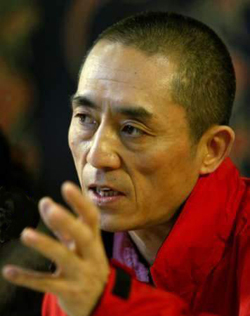Difference between revisions of "Zhang Yimou"
imported>Ciic |
imported>Ciic |
||
| Line 13: | Line 13: | ||
"The Love of the Hawthorn Tree" was screened in South Korea for the Pusan International Film Festival in 2010. | "The Love of the Hawthorn Tree" was screened in South Korea for the Pusan International Film Festival in 2010. | ||
| − | In the end of 2011, his epic film "The Flowers of War" | + | In the end of 2011, his epic film "The Flowers of War" against the milieu of [[Nanjing Massacre]] premieres in China. Adopted from [[Yan Geling]]'s novel, the movie has been applied for the Oscar's Best Foreign Language Film Academy Award. |
Meanwhile, Zhang Yimou is also famous for his cooperation with [[Zhang Weiping]] who has promoted and produced almost all of his films. However, the two have reportedly [http://www.china.org.cn/arts/2012-08/27/content_26338993.htm split up] after a 16-year filmmaking partnership. | Meanwhile, Zhang Yimou is also famous for his cooperation with [[Zhang Weiping]] who has promoted and produced almost all of his films. However, the two have reportedly [http://www.china.org.cn/arts/2012-08/27/content_26338993.htm split up] after a 16-year filmmaking partnership. | ||
Revision as of 09:22, 8 May 2013
One of China's fifth generation of filmmakers, Zhang Yimou (张艺谋) is a noted film director and cinematographer whose prized works include "Red Sorghum," "The Story of Qiu Ju" and "Not One Less."
Born in Xi'an, Shaanxi Province, Zhang was born into a Kuomintang family, which brought him troubles in his early life. He was forced out of school and worked as a farmer and later a worker of a cotton textile mill in Xianyang City. But favoring art, he developed a hobby in painting and photography. In 1978, at 27, he entered the Department of Cinematography of the Beijing Film Academy, beginning his film career.
Zhang's films are always highly controversial and reviewed with a mixture of praise and criticism. His newest film is no exception. Reviews are split on the film adapted from a novel based on the memoirs of a middle-aged woman. Biao Jiang, a film critic, said, Zhang is talented in capturing the lost worlds and pure love. But some viewers were not convinced by Zhang's depiction of true love. "The so called 'pure love' was created at a time when people were totally ignorant," said one reviewer at view.news.qq.com.
No matter how the reviews come out, Zhang has never stopped experimenting with different styles. His early works, such as "Red Sorghum," "Ju Dou," "Raise the Red Lantern" and "The Story of Qiu Ju," influenced many later art films. Meanwhile "Hero," “House of Flying Daggers" and "Curse of the Golden Flower" demonstrate his commercial success, though most of them failed to impress audiences.
In 2008, the splendor of the opening ceremony for the Beijing Olympic Games helped Zhang, who directed the gala, regain his reputation as an artistic genius. Yale University earlier this year awarded him an honorary doctorate degree for fine arts, describing him as "a genius with camera and choreography."
"The Love of the Hawthorn Tree" was screened in South Korea for the Pusan International Film Festival in 2010.
In the end of 2011, his epic film "The Flowers of War" against the milieu of Nanjing Massacre premieres in China. Adopted from Yan Geling's novel, the movie has been applied for the Oscar's Best Foreign Language Film Academy Award.
Meanwhile, Zhang Yimou is also famous for his cooperation with Zhang Weiping who has promoted and produced almost all of his films. However, the two have reportedly split up after a 16-year filmmaking partnership.
Shanghai Daily reported on May 8, 2013 that, a claim that Zhang Yimou, one of China's best known film directors, had two sons and a daughter with actress Chen Ting before they got married in 2011 was confirmed by people close to the couple. The news sparked a heated online debate about the rich flouting the country's one-child policy. It was Zhang's second marriage after his divorce from Xiao Hua, with whom he had a daughter.
